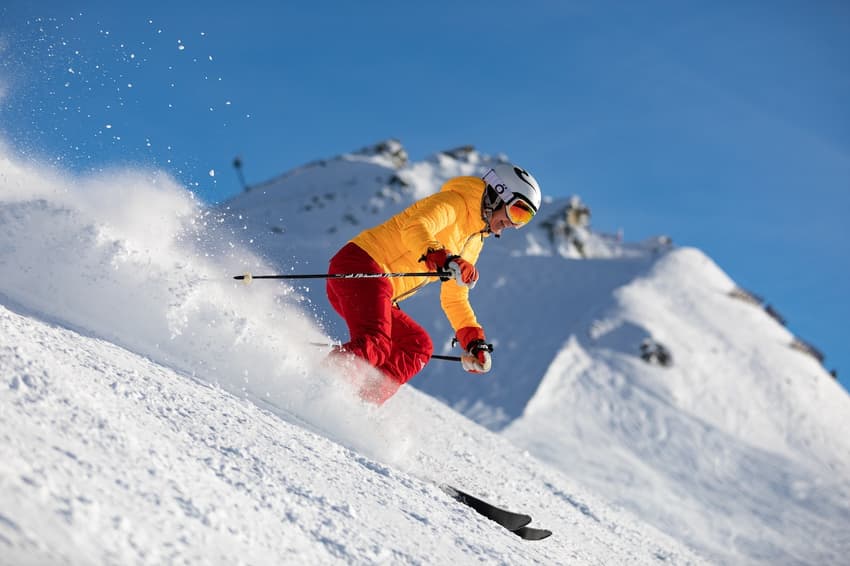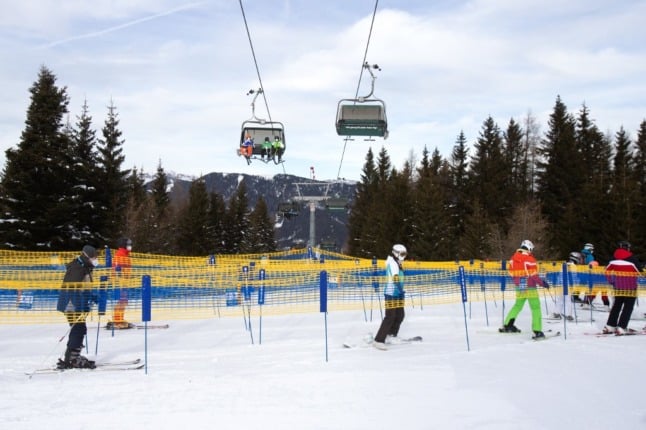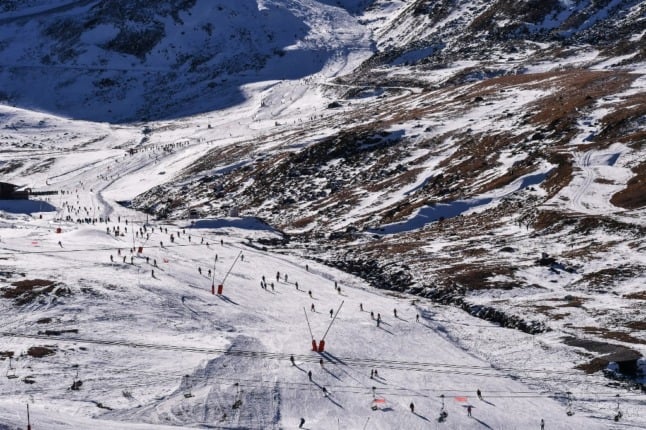What to expect from the ski season in Austria this winter

Skiers in Austria should expect to pay higher prices this winter as resorts are hit by rising costs. Many ski operators are also considering energy-saving actions. Here's how expensive it could get and which Covid measures could return.
After three winter seasons impacted by Covid-19 restrictions, Austrian resorts were hoping for a return to “normal” this year.
Instead, resorts are being hit by rising energy bills and high inflation – just like everyone else across the country – leading to some tough financial decisions.
So what does this mean for the coming winter season in Austria?
The Local took a closer look at the cost of ski passes and hotels, as well as whether resorts will be able to use snow making machines.
READ MORE: Discover Austria: How to make the most of 24 hours in Innsbruck
Hotels
The cost of staying in a hotel at a ski resort will be around 20 percent more this winter, reports Kurier.
Susanne Kraus-Winkler, Secretary of State for Tourism, thinks most ski tourists will simply “tolerate” the higher prices and continue to go skiing.
But Walter Veit, President of the Austrian Hoteliers’ Association, predicts that many people will not be able to afford a skiing holiday this winter due to the higher cost.
The increase in prices at hotels is mostly due to rising energy and food bills in Austria, with some businesses already paying three times more for energy than last year.
This was highlighted at the opening of the inaugural Vorarlberg Tourism Week on October 10th when it was revealed that hoteliers in the province are increasing their rates by 15 percent, reports ORF.
FOR MEMBERS: 29 ways to save money in Austria (but still have fun)
Heike Ladurner-Strolz from the Austrian Hotel Association (ÖHV) said: "You have to think very carefully about how much of the price increases you can pass on to the guest because we can't pass on 100 percent.
"It's a tightrope walk. I think it will be more difficult in the three or four-star range than in a small private guesthouse because you have a different audience there who have to watch their money more at home."
However, Kraus-Winkler, who was also in attendance at Vorarlberg Tourism Week, said many regular guests are already making bookings for the coming ski season.

A ski holiday will be considerably more expensive in Austria this year. (Photo by ALEX HALADA / AFP)
Ski passes
Skiers and snowboarders should expect to pay around eight percent more for a ski pass in Tyrol and Carinthia this year. In Salzburg, it could increase by up to 11 percent.
Here’s a quick overview of the some of the ticket prices that have been announced for this year:
- A day ticket at the Mölltal Glacier in Carinthia is expected to cost €59 this year.
- The Kitzbühel season ticket is €743 for the 2022/2023 winter season.
- A peak season day ticket (December 24th to March 17th) in St Johann in Tirol is €53.
- A day ticket at the Stubai Glacier in Innsbruck is €57.80.
- A day ticket in the Schladming-Dachstein region of Salzburg is €58.
Tickets are cheaper during off-peak season, which is up to December 23rd and from mid-March 2023.
READ ALSO: What you need to know about finding work in Austrian towns and villages
Bars, cafes and restaurants
In August, producer prices were 21 percent more than the same time last year, reports Der Standard.
And in a recent report by Gastro (a gastronomy trade publication), suppliers say they are expecting further price increases for certain foods this winter.
Tomatoes, beans, meat, dairy products and eggs are all forecast to rise in price, along with practical items like toilet paper and firewood.
As a result, some of these extra costs will be passed on to customers, which means higher prices on menus at alpine huts and restaurants this winter.
High prices in the gastronomy sector are already partly to blame for the current 10.5 percent inflation rate in Austria, with predictions that prices will continue to rise in the coming months.
Energy saving measures
Most ski business operators are aware that they can’t pass on all rising costs to customers this winter. So instead they are turning to cost-saving measures – especially when it comes to energy.
Solutions include switching off seat heating in lifts, using less lighting at stations and even stopping (or operating less) night skiing. The speed of cable cars could be reduced from midday or in the afternoon, and operators plan to use snow making machines more efficiently, reports news.at.
However, most ski resort operators want to cause as minimal disruption to the customer experience as possible.
Additionally, many Austrian hoteliers are anticipating energy saving measures from the federal government, similar to Germany’s mandate of heating hotels to a maximum of 19 degrees.
FOR MEMBERS: Discover Austria: 19 ways to make the most of autumn this year
Will there be enough snow?
At the Mölltal Glacier in Carinthia, the ski season usually starts in September. But this year it has been put back to October, with no set date yet on when it will open (although an opening party is planned for October 28th).
The main reason for the delay is the condition at the glacier, with ORF reporting that a large amount of ice was lost this summer due to warm weather. But rising energy bills are also playing a part as snow making has to be limited due to higher costs.
Snow making is a hot topic right now, as operators weigh up the cost of making artificial snow with the responsibility to provide a high standard of skiing facilities for guests. Although how much snow making will be needed won't be known until closer to the start of the season.
READ ALSO: UPDATED: Will Austria bring back face mask mandate to battle rising Covid cases?

(Photo by PHILIPPE DESMAZES / AFP)
What about Covid measures?
The pandemic has greatly affected winter season in Austria on previous years, but the country has very few measures still in place. There are no entry restrictions to Austria or to establishments in Austria and the authorities have said on several occasions that any strict measures such as a lockdown ruled out already.
Still, with infection and hospitalisations numbers rising, some measures might return. One that is expected to make a comeback sooner rather than later is the FFP2 mask mandate for indoor areas.
Will there be ski resort closures?
So far, closing ski resorts in Austria is off the menu and many operators say they are hesitant to even reduce services.
However, as explained above, skiing in Austria this winter could look slightly different due to energy saving measures, and will definitely cost more money.
Comments
See Also
After three winter seasons impacted by Covid-19 restrictions, Austrian resorts were hoping for a return to “normal” this year.
Instead, resorts are being hit by rising energy bills and high inflation – just like everyone else across the country – leading to some tough financial decisions.
So what does this mean for the coming winter season in Austria?
The Local took a closer look at the cost of ski passes and hotels, as well as whether resorts will be able to use snow making machines.
READ MORE: Discover Austria: How to make the most of 24 hours in Innsbruck
Hotels
The cost of staying in a hotel at a ski resort will be around 20 percent more this winter, reports Kurier.
Susanne Kraus-Winkler, Secretary of State for Tourism, thinks most ski tourists will simply “tolerate” the higher prices and continue to go skiing.
But Walter Veit, President of the Austrian Hoteliers’ Association, predicts that many people will not be able to afford a skiing holiday this winter due to the higher cost.
The increase in prices at hotels is mostly due to rising energy and food bills in Austria, with some businesses already paying three times more for energy than last year.
This was highlighted at the opening of the inaugural Vorarlberg Tourism Week on October 10th when it was revealed that hoteliers in the province are increasing their rates by 15 percent, reports ORF.
FOR MEMBERS: 29 ways to save money in Austria (but still have fun)
Heike Ladurner-Strolz from the Austrian Hotel Association (ÖHV) said: "You have to think very carefully about how much of the price increases you can pass on to the guest because we can't pass on 100 percent.
"It's a tightrope walk. I think it will be more difficult in the three or four-star range than in a small private guesthouse because you have a different audience there who have to watch their money more at home."
However, Kraus-Winkler, who was also in attendance at Vorarlberg Tourism Week, said many regular guests are already making bookings for the coming ski season.

Ski passes
Skiers and snowboarders should expect to pay around eight percent more for a ski pass in Tyrol and Carinthia this year. In Salzburg, it could increase by up to 11 percent.
Here’s a quick overview of the some of the ticket prices that have been announced for this year:
- A day ticket at the Mölltal Glacier in Carinthia is expected to cost €59 this year.
- The Kitzbühel season ticket is €743 for the 2022/2023 winter season.
- A peak season day ticket (December 24th to March 17th) in St Johann in Tirol is €53.
- A day ticket at the Stubai Glacier in Innsbruck is €57.80.
- A day ticket in the Schladming-Dachstein region of Salzburg is €58.
Tickets are cheaper during off-peak season, which is up to December 23rd and from mid-March 2023.
READ ALSO: What you need to know about finding work in Austrian towns and villages
Bars, cafes and restaurants
In August, producer prices were 21 percent more than the same time last year, reports Der Standard.
And in a recent report by Gastro (a gastronomy trade publication), suppliers say they are expecting further price increases for certain foods this winter.
Tomatoes, beans, meat, dairy products and eggs are all forecast to rise in price, along with practical items like toilet paper and firewood.
As a result, some of these extra costs will be passed on to customers, which means higher prices on menus at alpine huts and restaurants this winter.
High prices in the gastronomy sector are already partly to blame for the current 10.5 percent inflation rate in Austria, with predictions that prices will continue to rise in the coming months.
Energy saving measures
Most ski business operators are aware that they can’t pass on all rising costs to customers this winter. So instead they are turning to cost-saving measures – especially when it comes to energy.
Solutions include switching off seat heating in lifts, using less lighting at stations and even stopping (or operating less) night skiing. The speed of cable cars could be reduced from midday or in the afternoon, and operators plan to use snow making machines more efficiently, reports news.at.
However, most ski resort operators want to cause as minimal disruption to the customer experience as possible.
Additionally, many Austrian hoteliers are anticipating energy saving measures from the federal government, similar to Germany’s mandate of heating hotels to a maximum of 19 degrees.
FOR MEMBERS: Discover Austria: 19 ways to make the most of autumn this year
Will there be enough snow?
At the Mölltal Glacier in Carinthia, the ski season usually starts in September. But this year it has been put back to October, with no set date yet on when it will open (although an opening party is planned for October 28th).
The main reason for the delay is the condition at the glacier, with ORF reporting that a large amount of ice was lost this summer due to warm weather. But rising energy bills are also playing a part as snow making has to be limited due to higher costs.
Snow making is a hot topic right now, as operators weigh up the cost of making artificial snow with the responsibility to provide a high standard of skiing facilities for guests. Although how much snow making will be needed won't be known until closer to the start of the season.
READ ALSO: UPDATED: Will Austria bring back face mask mandate to battle rising Covid cases?

What about Covid measures?
The pandemic has greatly affected winter season in Austria on previous years, but the country has very few measures still in place. There are no entry restrictions to Austria or to establishments in Austria and the authorities have said on several occasions that any strict measures such as a lockdown ruled out already.
Still, with infection and hospitalisations numbers rising, some measures might return. One that is expected to make a comeback sooner rather than later is the FFP2 mask mandate for indoor areas.
Will there be ski resort closures?
So far, closing ski resorts in Austria is off the menu and many operators say they are hesitant to even reduce services.
However, as explained above, skiing in Austria this winter could look slightly different due to energy saving measures, and will definitely cost more money.
Join the conversation in our comments section below. Share your own views and experience and if you have a question or suggestion for our journalists then email us at [email protected].
Please keep comments civil, constructive and on topic – and make sure to read our terms of use before getting involved.
Please log in here to leave a comment.